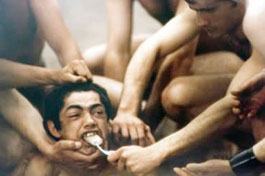home | north bay bohemian index | movies | current reviews | film review

Legendary Ickiness: Recasting Dante's 'Inferno' while indicting fascism.
Gory Glory
Pasolini's controversial 'Salò' comes to DVD
By Steve Palopoli
If a movie's notoriety can be judged by the number of people who talk about it without having seen it, then Salò is without a doubt the world's most notorious film. That's not completely a bad thing, as Pier Paolo Pasolini's final film is actually more fun to talk about than it is to watch; what Bret Easton Ellis' American Psycho was to literature, Salò is to motion pictures.
It's not Pasolini's best movie, but it is his most famous one. It's famous for being an adaptation of the Marquis de Sade's crazy novel 120 Days of Sodom. It's famous for taking the basic setup of that novel—four powerful men lock themselves in a fortress with a small army of young captives in order to unleash their most sadistic fantasies—and setting it in the last days of Mussolini's Italy. It's famous for dividing up its story into a bastardization of Dante's Inferno: the "Antechamber of Hell," the "Circle of Obsessions," the "Circle of Shit" and the "Circle of Blood." It's famous for living up to all of those circles with scenes of torture, rape, mutilation and lots and lots of poop. Most of all, though, it's famous for being nearly impossible to see.
Banned in several countries and the center of an obscenity case in the United States in 1994 (which was dismissed), the film is rarely screened, though it got a showing a few months ago at San Francisco's Yerba Buena theater. It became the most sought-after DVD in history, fetching $600 a copy and up on eBay, after the Criterion Collection released it in 1998 and then withdrew it because of licensing issues. The company showed some serious follow-through, though, and now has released a new edition that won't, it appears, be going anywhere soon.
The funny thing is that the movie's notoriety has very little to do with the movie itself. What really lofted it into cult-legend status was its inclusion in an article called "Disturbo 13: The Most Disturbing Horror Films Ever Made" by Stanley Wiater. I first discovered the article when it came out in a book called Cut! Horror Writers on Horror Film back in 1992. Reference books on extreme cinema weren't easy to find then, there was no Internet and the golden years of everything ever released coming out on DVD were still years away, so I used Wiater's list as a handy reference guide. For the most part, his picks for disturbing films were everything he made them out to be.
Recently, I discovered I'm not the only geek upon whom Wiater left a mark. The "Disturbo 13" list has become a part of Internet lore—just Google it and see what you get. Some fans have even taken it upon themselves to update the list, fair enough since it's over 15 years old. Salò, however, remains on almost every "Disturbo 13" list I could find. The legendary ickiness of this movie has taken root in film history. But I hope the release of the DVD gives more people (those who can stomach it, anyway) the chance to see it and talk about it as a film rather than as a phenomenon.
For one thing, the new DVD should alleviate questions about the washed-out nature of the bootlegs that circulated for years—it looks vivid and striking once again. With the film's many stark tableaux and its brutal misanthropy, Pasolini appears to have been far more influenced by Luis Buñuel than by the marquis (though both Sade and Buñuel had a lot more fun with their material). Like Ellis' novel, it's more interested in the boring emptiness of its monsters than in their gruesome exploits. Underneath its cold exterior Salò is an angry indictment of fascism, liberalism, consumerism, the modern world, the bourgeoisie and humanity in general.
What's most shocking of all in terms of Pasolini's work is that he could have made a film as ugly, cynical and bleak as Salo just three short years after finishing his "trilogy of life" with The Canterbury Tales.
But getting to the meaning of Salò is no small feat, even after repeat viewings, when its reputation precedes it so completely. Most recently, it was picked as the most controversial film ever made in a 2006 poll of Time Out! readers. Do you think they all saw it? Of course not. The shadow of Disturbo 13 is as long and dark as Pasolini's final vision.
Send a letter to the editor about this story.
|
|
|
|
|
|